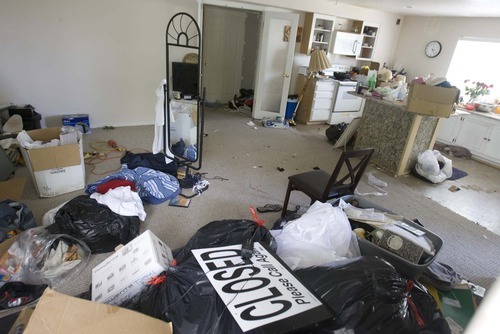This is an archived article that was published on sltrib.com in 2011, and information in the article may be outdated. It is provided only for personal research purposes and may not be reprinted.
Draper • It looked like a life interrupted.
There were stacks of black trash bags on the porch next to a dining room table and chairs under the outdoor awning at this split-level home in Draper's foothills.
On the table sat a pot partially filled with dried rice and tortilla chips. Roses in a vase rested on a windowsill. Visible inside was a kitchen in disarray — a bottle of cooking oil still on the counter, cords strewn across the adjacent living room floor and evidence of who once lived here — a colorful sign on the wall that read "Familia Callejas."
For the past month, the four family members had prepared for this day — getting rid of items, closing a small business they operated and the father, Felix Callejas, stepping down as a Mormon branch president after he, his wife and two teenage children were arrested April 19 for being in the country illegally.
But Monday — their deportation day — looked more like they had simply run out of time. This was the day they had to leave for El Salvador, with only slim opportunities of returning to Utah or the United States. Several weeks ago, Felix Callejas explained that his family bought a little extra time to tie up loose ends in exchange for voluntarily leaving June 13.
Lori Haley, Immigration and Customs Enforcement spokeswoman, confirmed that the family left Monday.
Immigration attorney Aaron Tarin— who has been involved with clients going through so-called self-deportations — said ICE agents typically either escort people to the airport and ensure they get on the plane or ask the airlines to verify they boarded.
"Sometimes, when they voluntarily leave, they'll have other family members or friends attempt to get their belongings to them," Tarin said. "Unfortunately, sometimes it's so expensive to do that, their stuff gets left behind."
The Draper case drew attention because Felix Callejas oversaw a flock of about 100 Mormons, casting in human terms the debate about immigration and the role of The Church of Jesus Christ of Latter-day Saints.
The Utah-based faithwould not comment Monday, though, church spokesman Scott Trotter previously said the case "reminds us all of the need to address immigration reform."
On Friday, the LDS Church issued a fresh statement on immigration in advance of an upcoming Republican fight over a resolution to repeal a guest-worker bill signed earlier this year by Gov. Gary Herbert.
The statement warned against "mass expulsion or mistreatment of individuals or families" and called for "an approach where undocumented immigrants are allowed to square themselves with the law."
The Callejas family was arrested after Felix Callejas lost his bid for asylum. A few weeks ago, his 18-year-old daughter, Margarita Callejas, became emotional when she talked about leaving her friends at school and said she wasn't sure what she would do in El Salvador.
The family had shunned publicity leading up to Monday's deportation date, though Felix Callejas suggested earlier he might write a book about his experiences.
Twitter: @davemontero



